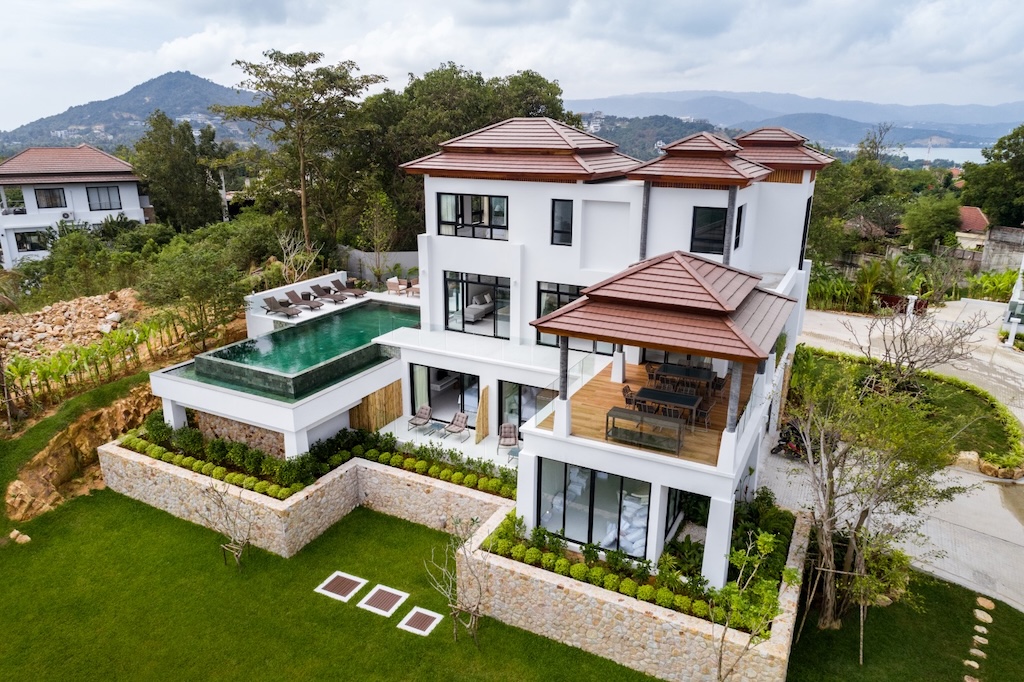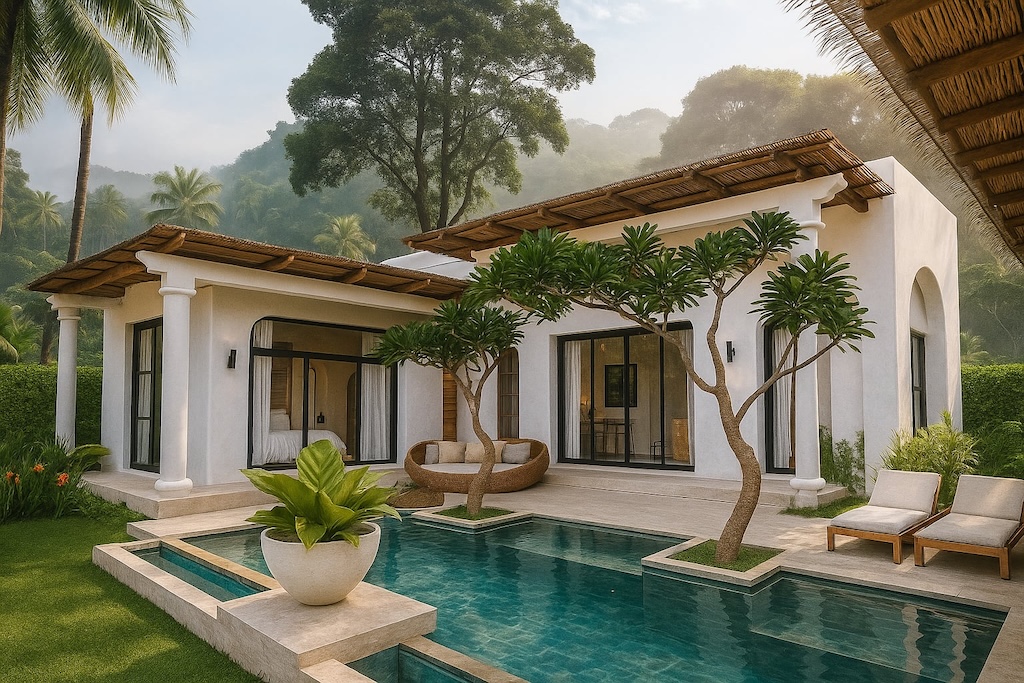
Bangkok Property Investment Potential – Bangkok, the vibrant capital of Thailand, has long been a magnet for investors seeking lucrative opportunities in the real estate market. As you explore the potential of Bangkok real estate investment, you’ll find a dynamic landscape that offers a unique blend of traditional charm and modern sophistication. The city’s skyline is a testament to its rapid development, with gleaming skyscrapers standing alongside historic temples and bustling markets.
In recent years, Bangkok’s real estate sector has experienced significant growth, driven by factors such as urbanization, economic expansion, and increasing foreign interest. The market has shown resilience even in the face of global economic challenges, making it an attractive proposition for both domestic and international investors.
As you delve into the world of Bangkok property investment, you’ll discover a diverse range of options catering to various budgets and preferences. From luxurious condominiums in the heart of the city to more affordable units in up-and-coming neighborhoods, the Bangkok real estate market offers something for every investor profile.
Why Bangkok is a Prime Location for Property Investment
Bangkok’s appeal as a prime location for property investment stems from a combination of factors that set it apart from other Asian cities. Here are some compelling reasons why you should consider investing in Bangkok’s real estate:
- Economic Hub: Bangkok serves as the economic powerhouse of Thailand, contributing significantly to the country’s GDP. The city’s robust economy and growing business sector create a constant demand for both residential and commercial properties.
- Strategic Location: Situated at the heart of Southeast Asia, Bangkok acts as a gateway to the region, making it an ideal base for businesses and expatriates alike.
- Tourism Magnet: The city’s rich cultural heritage, world-renowned cuisine, and vibrant nightlife continue to attract millions of tourists annually, driving demand for short-term rentals and hotel-like accommodations.
- Infrastructure Development: Ongoing improvements in public transportation, including the expansion of the BTS Skytrain and MRT subway systems, enhance connectivity and property values in various neighborhoods.
- Relatively Affordable Prices: Compared to other major Asian cities like Hong Kong or Singapore, Bangkok offers relatively affordable property prices, allowing investors to enter the market with lower capital requirements.
These factors combine to create a favorable environment for property investment, offering potential for both capital appreciation and rental income generation.
Types of Property Available for Investment in Bangkok
As you explore the Bangkok property market, you’ll encounter a diverse array of investment options. Understanding the different types of properties available will help you make an informed decision based on your investment goals and budget. Here’s an overview of the main property types in Bangkok:
1. Bangkok Condominiums
Condominiums are among the most popular choices for property investors in Bangkok. They offer easy maintenance, resort style amenities such as swimming pools, gyms, and security services, potential for both long-term rentals and short-term holiday lets & property management.
2. Bangkok Apartments
Similar to condominiums but typically older buildings with fewer amenities. They can offer lower purchase prices, opportunities for renovation and value addition, steady rental income from long-term tenants.
3. Bangkok Townhouses
These multi-story homes are ideal for families and offer more space compared to condominiums, private entrances and sometimes small gardens, potential for higher rental yields in family-oriented neighborhoods.
4. Detached Bangkok Houses
While less common in central Bangkok, detached houses in suburban areas provide ample living space and privacy, potential for significant capital appreciation as the city expands, attractive options for expatriate families seeking a more residential environment.
5. Bangkok Commercial Properties
For those interested in business-oriented investments, options include office spaces in prime business districts, retail units in shopping centers or street-front locations, mixed-use developments combining residential and commercial elements
Each property type comes with its own set of advantages and considerations. Your choice will depend on factors such as your investment budget, target rental market, and long-term objectives.
The Legal Framework for Foreign Property Investment in Bangkok Thailand
Understanding the legal landscape is crucial when considering Bangkok property investment as a foreigner. Thailand has specific regulations governing foreign ownership of property, which you need to be aware of to make informed decisions and avoid potential pitfalls.
Key points to consider in the legal framework include:
- Condominium Act: This law allows foreigners to own condominiums outright, but with restrictions:
- Foreign ownership in any condominium project is limited to 49% of the total unit area.
- The money used for purchase must be brought into Thailand as foreign currency.
- Land Ownership: Foreigners are generally prohibited from owning land in Thailand. However, there are exceptions:
- Companies with majority Thai ownership can own land.
- Long-term leases (up to 30 years, renewable) are possible for land.
- Property Holding Structures: Some investors use Thai limited companies to hold property, but this requires careful legal structuring and compliance with Thai business laws.
- Board of Investment (BOI) Promotion: In some cases, foreign investors may be granted land ownership rights through BOI promotion for specific business activities.
- Inheritance Laws: Be aware that Thai inheritance laws may affect how property can be passed on to heirs.
It’s essential to work with reputable legal advisors who specialize in Thai property law to navigate these regulations effectively and ensure your investment is legally sound.
Key Neighborhoods for Bangkok Property Investment
Choosing the right neighborhood is crucial for maximizing your return on investment in Bangkok’s real estate market. Each area of the city offers unique characteristics and potential for growth. Here’s an overview of some key neighborhoods to consider:
1. Sukhumvit
- Profile: Upscale, cosmopolitan area popular with expatriates
- Advantages:
- Excellent BTS Skytrain connectivity
- High-end shopping and dining options
- Strong rental demand from both locals and foreigners
2. Silom/Sathorn
- Profile: Central Business District with a mix of office and residential properties
- Advantages:
- Prime location for professionals working in finance and corporate sectors
- Growing nightlife and entertainment scene
- Potential for high rental yields from corporate tenants
3. Thonglor/Ekkamai
- Profile: Trendy area known for its hip cafes, restaurants, and nightlife
- Advantages:
- Popular among young professionals and creative types
- Steady appreciation in property values
- Strong potential for short-term rentals catering to tourists
4. Ratchathewi/Phaya Thai
- Profile: Up-and-coming area benefiting from improved transportation links
- Advantages:
- More affordable entry prices compared to established areas
- Proximity to universities, creating demand for student accommodation
- Potential for significant capital appreciation as the area develops
5. Riverside
- Profile: Scenic area along the Chao Phraya River with luxury developments
- Advantages:
- Unique views and lifestyle offerings
- Growing popularity among high-net-worth individuals
- Potential for premium returns on high-end properties
When evaluating neighborhoods, consider factors such as:
- Proximity to public transportation
- Local amenities and infrastructure
- Future development plans in the area
- Target rental market (expatriates, students, young professionals, etc.)
By carefully assessing these factors, you can identify the neighborhoods that best align with your investment strategy and goals.
Potential Returns on Investment in Bangkok Property
Investing in Bangkok’s property market can offer attractive returns, but it’s important to have realistic expectations and understand the factors that influence profitability. Here’s an overview of potential returns you might expect:
Capital Appreciation
- Historically, Bangkok property values have shown steady growth, with some areas experiencing significant appreciation.
- Annual capital gains of 5-10% have been common in prime locations, though past performance doesn’t guarantee future results.
- Emerging neighborhoods with infrastructure improvements may offer higher appreciation potential.
Rental Yields
- Gross rental yields in Bangkok typically range from 4% to 8%, depending on location and property type.
- High-end condominiums in central areas often yield 4-6% annually.
- More affordable units in up-and-coming areas can sometimes achieve yields of 6-8%.
Factors Affecting Returns
- Location: Prime areas generally offer lower yields but higher potential for capital appreciation.
- Property Type: Smaller units often provide better rental yields, while larger properties may see stronger capital growth.
- Market Timing: Buying during a market downturn can enhance long-term returns.
- Property Management: Effective management can maximize occupancy rates and rental income.
- Economic Conditions: Overall economic growth and foreign investment trends impact property market performance.
It’s crucial to conduct thorough due diligence and consider seeking advice from local real estate professionals to accurately assess potential returns for specific properties and areas.
How to Get Started with Bangkok Property Investment
Embarking on your Bangkok property investment journey requires careful planning and execution. Here’s a step-by-step guide to help you get started:
- Define Your Investment Goals
- Determine whether you’re seeking rental income, capital appreciation, or a combination of both.
- Clarify your investment horizon (short-term, medium-term, or long-term).
- Research the Market
- Familiarize yourself with different neighborhoods and property types.
- Study market trends, pricing, and rental yields in your areas of interest.
- Set Your Budget
- Consider all costs involved, including purchase price, taxes, and ongoing expenses.
- Factor in potential financing options if you’re not paying cash.
- Assemble Your Team
- Engage a reputable real estate agent with experience in working with foreign investors.
- Hire a qualified lawyer to guide you through legal aspects of the purchase.
- Consider working with a property management company if you plan to rent out your investment.
- Visit Bangkok
- If possible, visit the city to get a firsthand feel for different neighborhoods.
- View multiple properties to understand what’s available within your budget.
- Conduct Due Diligence
- Thoroughly investigate any property you’re seriously considering.
- Check the developer’s track record for off-plan purchases.
- Verify all legal documents and ensure clear title to the property.
- Negotiate and Make an Offer
- Work with your agent to negotiate the best possible price and terms.
- Be prepared to move quickly in competitive markets.
- Complete the Purchase
- Follow all legal procedures for property transfer in Thailand.
- Ensure all necessary documents are properly executed and registered.
- Develop a Management Plan
- If renting out the property, decide whether to manage it yourself or hire a property manager.
- Set up systems for maintenance, rent collection, and addressing tenant issues.
- Monitor Your Investment
- Regularly review the performance of your property against your investment goals.
- Stay informed about market trends and adjust your strategy if necessary.
By following these steps and seeking professional advice when needed, you’ll be well-positioned to make a successful entry into the Bangkok property market.
Long-term vs. Short-term Property Investment Strategies in Bangkok
When investing in Bangkok property, it’s crucial to align your strategy with your financial goals and risk tolerance. Both long-term and short-term approaches offer distinct advantages and challenges. Let’s explore these strategies to help you determine which might be best suited for your investment objectives.
Long-term Investment Strategy
Characteristics:
- Holding period of 5 years or more
- Focus on capital appreciation and steady rental income
- Less affected by short-term market fluctuations
Advantages:
- Potential for significant capital gains over time
- Opportunity to benefit from compound growth
- Steady rental income stream
- Time to ride out market downturns
Considerations:
- Requires patience and a long-term outlook
- May tie up capital for extended periods
- Need to stay informed about long-term market trends and demographic shifts
Short-term Investment Strategy
Characteristics:
- Holding period of 1-5 years
- Focus on quick capital gains or high rental yields
- More responsive to market trends and cycles
Advantages:
- Potential for quicker returns on investment
- Ability to capitalize on short-term market opportunities
- More flexibility to adjust strategy based on market conditions
- Easier to diversify across multiple properties or markets
Considerations:
- Higher risk due to market volatility
- May incur higher transaction costs with frequent buying and selling
- Requires more active management and market monitoring
Choosing Your Strategy
To determine which strategy is right for you, consider the following factors:
- Your investment goals (income vs. capital growth)
- Risk tolerance
- Available capital and financing options
- Time and resources for property management
- Market conditions and projections
Many successful investors in Bangkok employ a mixed strategy, combining elements of both long-term and short-term approaches to balance risk and reward across their portfolio.
The Impact of Infrastructure Development on Bangkok Property Values
Bangkok’s ongoing infrastructure development plays a crucial role in shaping the city’s real estate landscape and influencing property values. As an investor, understanding these developments and their potential impact is essential for making informed decisions. Here’s an overview of key infrastructure projects and their implications for property investment:
Mass Transit Expansion
- BTS Skytrain and MRT Subway Extensions: New lines and extensions are opening up previously less accessible areas, potentially boosting property values in these locations.
- Impact: Areas near new stations often see significant appreciation in property values and increased rental demand.
Airport Rail Link
- Expansion Plans: Proposals to extend the Airport Rail Link to Don Mueang Airport and U-Tapao Airport.
- Impact: Improved connectivity between airports and the city center could increase demand for properties along these routes.
High-Speed Rail Projects
- Bangkok-Nakhon Ratchasima Line: Part of the larger plan to connect Bangkok with China via Laos.
- Impact: May create new investment opportunities in areas along the route and at major stations.
Road Infrastructure
- New Expressways and Tunnels: Projects like the Rama III-Dao Khanong Expressway aim to reduce traffic congestion.
- Impact: Improved road access can enhance the attractiveness of certain areas, potentially increasing property values.
Smart City Initiatives
- Digital Infrastructure: Plans to implement 5G networks and smart city technologies across Bangkok.
- Impact: Areas benefiting from these initiatives may see increased demand, particularly from tech-savvy residents and businesses.
Chao Phraya River Promenade
- Riverside Development: Plans for a 14km promenade along the Chao Phraya River.
- Impact: Could significantly enhance the appeal of riverside properties and create new investment opportunities.
Eastern Economic Corridor (EEC)
- Major Economic Zone: While not in Bangkok, the EEC’s development may have spillover effects on the capital’s property market.
- Impact: Potential increase in demand for Bangkok properties from businesses and workers connected to the EEC.
When considering property investment in Bangkok, pay close attention to announced and ongoing infrastructure projects. Properties in areas set to benefit from improved connectivity or urban development initiatives may offer strong potential for appreciation. However, it’s important to verify the status and timeline of these projects, as delays or changes in plans can affect expected returns.
Working with Real Estate Agents and Property Managers in Bangkok
Navigating the Bangkok property market can be challenging, especially for foreign investors. Working with professional real estate agents and property managers can significantly simplify the process and help you make more informed decisions. Here’s what you need to know about collaborating with these professionals:
Real Estate Agents
Benefits of Working with Agents:
- Local market knowledge and investment insights
- Access to a wider range of properties, including off-market listings
- Assistance with price negotiations
- Guidance through the purchasing process
Choosing the Right Agent:
- Look for agents with experience working with foreign investors
- Seek recommendations from other investors or expats
- Ensure they have a good understanding of your investment goals
Tips for Effective Collaboration:
- Be clear about your requirements and budget
- Ask for detailed market reports and property analyses
- Don’t hesitate to ask questions about the local market and regulations
- Understand the agent’s fee structure upfront
Property Managers
Role of Property Managers:
- Handling tenant screening and placement
- Collecting rent and managing finances
- Organizing property maintenance and repairs
- Ensuring compliance with local regulations
Advantages of Using Property Management Services:
- Saves time and reduces stress, especially for overseas investors
- Potentially higher occupancy rates and better tenant quality
- Professional handling of maintenance issues and tenant relations
- Regular reporting on property performance
Selecting a Property Management Company:
- Research their track record and client testimonials
- Understand their fee structure and services offered
- Ensure they have experience with your property type and target tenant market
- Check their systems for financial reporting and maintenance tracking
Effective Property Management Collaboration:
- Establish clear communication channels and reporting expectations
- Set specific performance goals and review them regularly
- Discuss strategies for maximizing rental income and property value
- Stay informed about major decisions while trusting their day-to-day management
By leveraging the expertise of professional real estate agents and property managers, you can enhance your chances of success when investing in the Bangkok property market. These professionals can provide valuable insights, save you time, and help you navigate the complexities of investing in a foreign market.
Future Outlook: Bangkok’s Property Investment Market Trends
As you consider investing in Bangkok’s property market, it’s crucial to look ahead and understand the trends that may shape the future of real estate in the city. While predicting market movements with certainty is impossible, several factors and trends are likely to influence Bangkok’s property landscape in the coming years:
1. Continued Urban Development
- Ongoing transformation of Bangkok’s skyline with new high-rise developments
- Redevelopment of older areas, creating new investment opportunities
2. Shift Towards Mixed-Use Developments
- Increasing popularity of projects combining residential, commercial, and retail spaces
- Focus on creating self-contained communities that offer convenience and lifestyle amenities
3. Growing Emphasis on Sustainability
- Rising demand for eco-friendly and energy-efficient buildings
- Potential for green certifications to become a significant factor in property valuation
4. Technology Integration
- Smart home features becoming standard in new developments
- Increased use of proptech in property management and transactions
5. Changing Demographics
- Aging population may drive demand for retirement-friendly properties
- Younger generations’ preferences shaping new development concepts
6. Infrastructure-Driven Growth
- Continued impact of mass transit expansions on property values
- Potential for new economic corridors to emerge based on infrastructure projects
7. Foreign Investment Policies
- Possible changes in regulations affecting foreign property ownership
- Potential for new incentives to attract international investors
8. Economic Factors
- Impact of global economic trends on local property market
- Potential for shifts in key industries affecting housing demand
9. Tourism Recovery and Evolution
- Long-term effects of global travel trends on the short-term rental market
- Adaptation of hospitality-oriented properties to changing tourist preferences
10. Suburbanization Trends
- Potential for increased interest in properties outside the city center
- Development of satellite cities and their impact on the greater Bangkok area
As an investor, staying informed about these trends and their potential implications will be crucial for making strategic decisions. Regularly reviewing market reports, attending real estate forums, and consulting with local experts can help you stay ahead of the curve and identify emerging opportunities in Bangkok’s dynamic property market.
Conclusion: Is Bangkok Property Investment Right for You?
As we conclude this comprehensive guide to Bangkok property investment, it’s time to reflect on whether this opportunity aligns with your investment goals and risk tolerance. Bangkok’s real estate market offers a unique blend of potential rewards and challenges that warrant careful consideration.
Key Takeaways:
- Bangkok presents diverse investment opportunities across various property types and neighborhoods.
- The city’s ongoing infrastructure development and economic growth support long-term market potential.
- Legal frameworks for foreign investment require careful navigation but offer viable pathways for property ownership.
- Both long-term and short-term investment strategies can be successful, depending on your objectives.
- Working with local professionals can significantly enhance your investment experience and outcomes.
Factors to Consider:
- Your investment budget and financing options
- Risk tolerance and ability to weather market fluctuations
- Long-term goals: capital appreciation, rental income, or both
- Familiarity with and interest in the Thai market and culture
- Ability to manage a property remotely or willingness to engage local management
Final Thoughts:
Bangkok property investment can be a rewarding venture for those who approach it with due diligence, realistic expectations, and a well-thought-out strategy. The city’s vibrant culture, strategic location, and developing infrastructure create a compelling case for real estate investment. However, like any investment, it comes with its own set of risks and challenges.
Before making a decision, we encourage you to:
- Conduct thorough research on specific areas and properties of interest
- Consult with financial advisors to understand how Bangkok property fits into your overall investment portfolio
- Visit Bangkok, if possible, to get a firsthand feel for the market and lifestyle
Ready to explore Bangkok’s property investment potential further? Take the next step by connecting with a reputable local real estate agent who specializes in working with foreign investors. They can provide you with current market insights, property recommendations tailored to your goals, and guidance on navigating the investment process. Don’t miss out on the opportunities Bangkok has to offer – start your investment journey today!
Remember, successful property investment in Bangkok requires patience, diligence, and ongoing market awareness. By leveraging the insights provided in this guide and seeking professional advice, you’ll be well-equipped to make informed decisions and potentially unlock the rewards of Bangkok’s dynamic real estate market.





